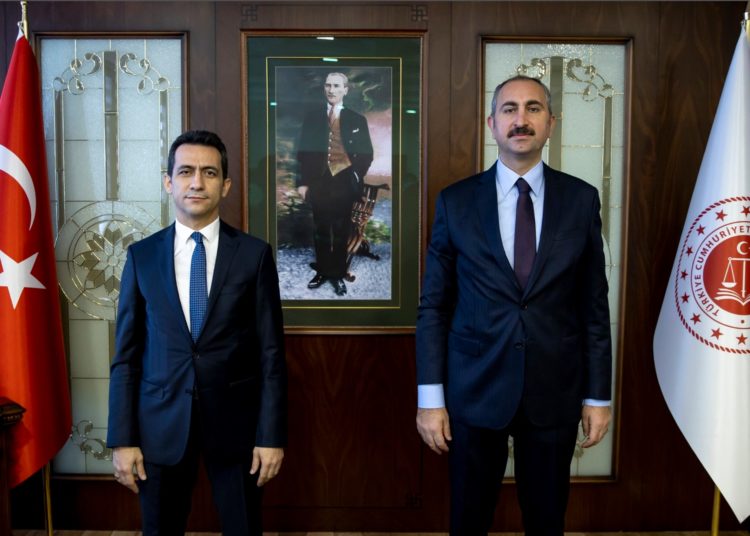Abdullah Bozkurt/Stockholm
Turkish judicial authorities engaged in a blame game among themselves when their request for the extradition of a dissident from the US on bogus charges failed to convince the US State Department, which asked Turkey to provide concrete evidence.
A document that detailed internal communications between the Turkish Justice Ministry and the Ankara Chief Public Prosecutor’s Office, a copy of which was obtained by Nordic Monitor, revealed how the Justice Ministry was not satisfied with a new dossier to be forwarded to the US to support the extradition.
The subject of the extradition request is a man named Ali Ursavaş, a dissident who opposes the government of President Recep Tayyip Erdoğan and currently lives in exile in the US. He is affiliated with the Gülen movement, led by Erdoğan foe Fethullah Gülen, who also resides in the US and also faced an extradition request filed by Turkey on February 2, 2017.
The document mentioned the response of the State Department, which said said the US government was not convinced of Turkey’s accusations against Ursavaş and asked Turkish authorities to provide concrete evidence for the extradition request to support the accusations.
Failing to convince the US on the extradition of Ursavaş, the Justice Ministry sent an urgent note to the Ankara Chief Public Prosecutor’s Office saying the extradition request filed with US authorities for Ursavaş, a 59-year-old medical doctor, lacked concrete evidence.
The communiqué, signed by Emrah Özkan of the General Directorate of Foreign Relations in the Justice Ministry on October 5, 2021, indicated that the US State Department requested additional information on the substance of the crimes allegedly committed by Ursavaş as well as solid evidence. Özkan told the Ankara Chief Public Prosecutor’s Office to come up with what he described as a “case file review report” on Ursavaş, listing the alleged crimes that Ursavaş was personally involved in and concrete evidence that links Ursavaş to these alleged crimes.
Turkish government document that details the US State Department’s note sent to Turkey regarding the extradition of a dissident. The government’s case file failed to convince US officials of the credibility of the evidence:
Özkan said the US government’s response must be shared with the Ankara 4th High Criminal Court, which issued an arrest warrant for Ursavaş on January 30, 2017 and that a new summary report must be prepared by October 29 at the latest. He also urged the prosecutor’s office to include additional evidence collected against Ursavaş since the filing of the first request provided that such evidence would facilitate the extradition procedure.
The Ankara Chief Public Prosecutor’s Office sent two replies to the Justice Ministry’s letter, on October 22 and 25, 2021 in which it simply repeated the earlier allegations and listed two additional statements that identified Ursavaş as a man who is affiliated with the Gülen movement.
Interestingly, the two statements added to the extradition file came from two Gülenists who were abducted from abroad by Turkish intelligence agency MIT and forced to give statements under torture. One statement was given by Selahaddin Gülen, a 30-year-old US resident who was kidnapped in May 2021 by MIT from Kenya, where he was working as a teacher.

He is also a nephew of President Erdoğan’s arch-foe, Fethullah Gülen, and his kidnapping in Kenya and imprisonment in Turkey are part of campaign of intimidation waged by the Erdoğan government to punish critics, opponents and dissidents. In his statement he was asked if he knew Ursavaş, whom he said he knew from the US.
The second statement added to the extradition file came from Orhan İnandı, a dual Turkish-Kyrgyz national who was abducted by MIT in Bishkek on May 31, 2021. In his police statement İnandı, who was also tortured by the intelligence agency for a month before he was allowed to give a statement to the police, said he knew Ursavaş as well.
A court order issued for the extradition of Ali Ursavaş in 2019 on bogus charges is part of an intimidation campaign waged by the Turkish government, which blatantly abuses criminal procedures to stifle dissent and suppress critical voices:
Neither statement included any criminal element with respect to Ursavaş, who had interacted with many Turkish teachers abroad when he was organizing international culture festivals in Turkey and bringing students to compete in culture, song and language contests. He was chairman of the International Turkish Education Association (TÜRKÇEDER), which actively promoted intercultural activities and brought thousands of foreign students from well over 100 countries to Turkey each year.
The association was blocked from hosting its Olympiads in Turkey by the Erdoğan government in 2014, and it had to move the event abroad, holding it in the Ethiopian capital of Addis Ababa in June 2014, followed by cities in Europe in the following years. The association, which had been active since 2003, was shut down by the Erdoğan government in 2016. The Olympiads continue to be held abroad by other organizations linked to the Gülen movement.

Apparently concerned that a new case file prepared for a renewed extradition request for Ursavaş would again fail to convince the US authorities, the Justice Ministry wrote a new letter to the Ankara Chief Public Prosecutor’s Office on November 3, 2021 asking for further clarification. It said it had returned the new case file to the prosecutor’s office and noted that a new assessment must be made by the Ankara 4th High Criminal Court.
In so many words, the Justice Ministry made clear that the ball was in the prosecutor’s court and that the ministry would simply act as a courier to convey the case file to the US authorities. It is clear that the ministry was trying to distance itself and put the responsibility on the prosecutor’s office and the court in the event of the failure of a second attempt to extradite Ursavaş from the US.
Justice Ministry officials also warned that time was running out on the extradition request as the US authorities had put a deadline on the submission of the new evidence to support the extradition in line with Article 8 of a bilateral extradition treaty between Turkey and the US. The ministry asked the prosecutor’s office to make a final determination by November 17, 2021.

The communiqué reveals how the Erdoğan government abused the intergovernmental mechanism with the US to file frivolous extradition requests that lacked solid evidence.
Turkey has gained notoriety under the oppressive regime of President Erdoğan when it comes to abusing the criminal justice system and manipulating criminal procedures to muzzle critical voices, stifle dissent and intimidate the opposition. Turkish authorities are quick to brand opponents of the current regime as terrorists, and partisan prosecutors have been known to fabricate evidence to build bogus cases against unsuspecting people who have nothing to do with terrorism or crime.
According to the arrest warrant, Ursavaş was charged with multiple crimes ranging from terrorism to coup plotting to espionage. He faces life in prison should he be returned to Turkey.
Turkey’s extradition request for him is not expected to succeed. Yet it represents a form of harassment by the Erdoğan government against journalists, academics, critics and dissidents who live abroad.













